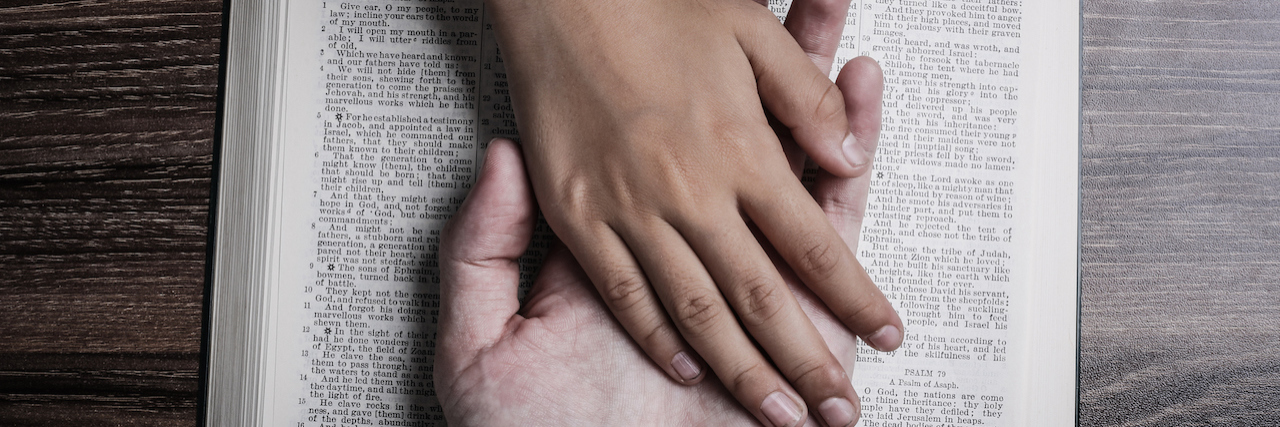Depression, anxiety, ADHD, fibromyalgia, chronic fatigue syndrome — the list goes on. Having multiple medical conditions can make you feel weak, sad and like you’ve somehow failed at life. I put on a good act and will run myself in to the ground to do things for other people with a smile on my face — all while I feel like I’m dying inside. When I finally started opening up to my pastor, I don’t know what I expected. I suppose in my own mind, he was going to view me the way I viewed myself: pathetic. When I finally shared the struggles I was going through and the conditions I was dealing with, he responded with kindness and understanding — but more importantly, he emphasized that I was strong. Me, strong? Surely not. Not when I’m stuck on the couch sleeping 20 hours out of the day. Not when I’m so depressed I feel that ending my life is the only way out. Not when anxiety makes it impossible to pick up the phone. Not me — I’m not strong.
He emphasized the courage and strength it takes to keep walking through life despite those obstacles. He encouraged me to keep fighting and not to give up hope. He praised me for being open about my struggles and continuing to try my best (even when I feel like a complete failure). His words were ones of support and admiration — not criticism or judgment. No matter your faith or beliefs, having someone you trust and respect validate your feelings and provide encouragement is invaluable.
His words are another weapon in my arsenal again the pain and frustration I so frequently encounter. His words give me hope and make me feel stronger than I have ever felt. But why? Why did the words of one man mean so much?
Because it wasn’t what I expected, at all.
I expected a generic response about leaning on God, having faith and all the other things a pastor is “supposed” to say. After all, isn’t that his job? But instead, he acknowledged that he didn’t understand what I was going through:
“I just simply do not understand the type and level of life issues you are dealing with here. My heart absolutely aches for you and I wish I could take it all away for you. I have experienced mild (emphasis on mild) trials that help me to relate here or there, but dealing with those types of things on an ongoing, non-stop basis takes it completely to another stratosphere to where I cannot possibly relate.”
He didn’t so what people frequently do — he didn’t claim to understand. So often people say things like, “Yeah, I get anxious also,” or, “I know, I’m tired today too.” But it’s not the same. Everyone gets sad or anxious or tired. But not everyone has chronic conditions that cause you to live life with those issues as a persistent problem. My pastor understood that. He didn’t claim to understand — he admitted he couldn’t fully relate. And that validated my pain and struggles.
It doesn’t matter who it is — validation means something when you are facing difficult conditions. That validation, that acceptance, is key to seeing yourself differently. It gave me to freedom to accept my conditions — to accept my struggles were genuine. His words gave me something I didn’t feel like I had much of — strength. He gave me strength by accepting my conditions as real and not being afraid to say, “I don’t understand.” It made me stronger because I was being heard and respected. Without realizing, he made me stronger simply by acknowledging he didn’t fully understand what my life must be like. That kind of admission is painfully rare in society. People want to understand, and they think they understand — but they don’t. And you are left with two choices: let them believe they know what it is like to live with your condition, or try to explain they don’t understand without sounding rude or arrogant. Neither option is ideal, but I usually just smile and let people think they really know how it feels to be me. They don’t. But it’s rarely worth trying to clarify.
My pastor changed my perception of myself by validating I was dealing with legitimate challenges, far beyond the scope of “normal” or “everyday” problems. He didn’t make me feel weak — I was the one making myself feel weak by not accepting the reality of my circumstances. Yes, I live with chronic conditions and struggle to get by. But you know what? That’s OK. Because I’m still here. And that means I am strong. Every day that I wake up and try again takes strength. He showed me that by having an open, understanding heart. He showed me my own strength that I didn’t realize I had. And that strength is going to get me through every tomorrow.
Getty image via ChristianChan

